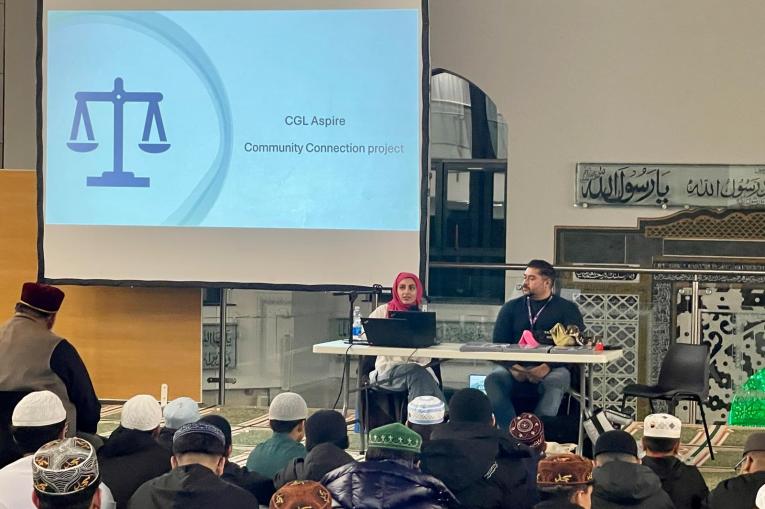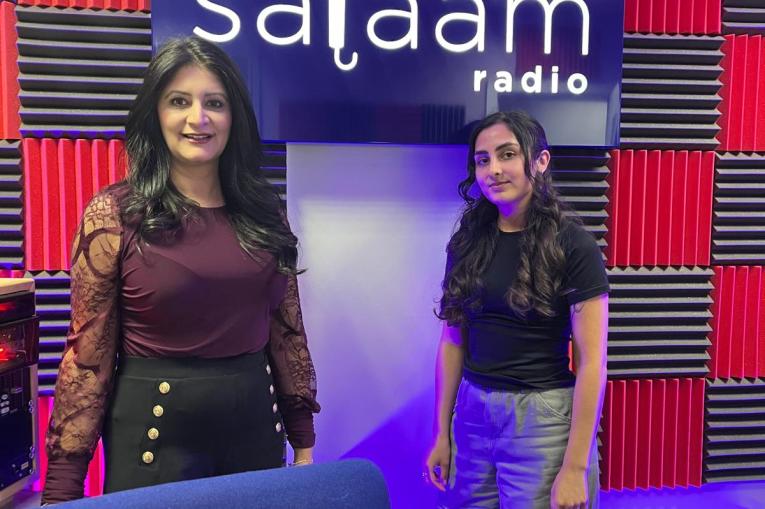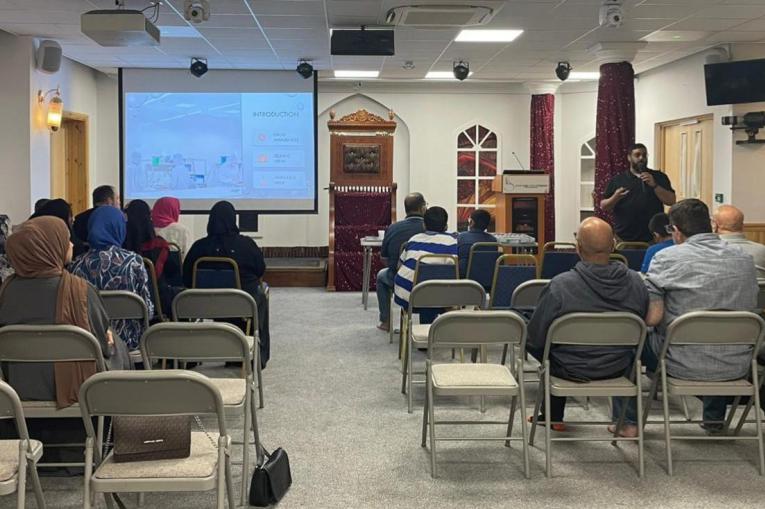
Aspire’s new ‘Community Connector’ approach is helping people to access and engage with support – and tackling stigma within communities that the service was previously unable to reach.
When he joined Change Grow Live’s Aspire drug and alcohol service, Raja Alyas noticed that some communities he had encountered during his previous work within prisons were missing. Raja knew that the need was there, but these groups – particularly those from South Asian communities – were underrepresented within treatment.
Working with limited budget and resources, Team Leader Raja and his colleagues attempted a few different outreach approaches. But reaching these communities is a long-term challenge that requires consistency, to build up trust and understand their distinct needs. Without a joined-up approach, and relying on staff already busy with their own caseloads, progress was minimal and short-lived.
When funding became available, Aspire and local commissioners created an innovative new role focussed on community outreach. In 2023, Recovery Worker Aaliyah Shirazi began her new role as Aspire’s Community Connector.
With a wide-open brief, Aaliyah began by scrolling through local events websites. She sent dozens of emails to groups involved with mental health and wellbeing, or with South Asian and Muslim communities, to offer drop-in sessions and talks. Responses trickled in, and Aaliyah had to be persistent, and patient. But once she began to lead events, she says, “it kind of snowballed.”
Seeing results
Just over a year on, the impacts are being felt. Since Aaliyah took on the role, says Raja, “there's been an increase in referrals from every community we were targeting. Looking at the British Asian and British Pakistani communities, we had around 20 people in treatment last year; this year we've got 33. We had 12 people from the Black African British communities, and we now have 17. The numbers are not huge, as Peterborough’s a small place. But in terms of percentage, that’s significant.”
Crucially, retention has massively improved. Aaliyah’s caseload includes around 14 people who are in treatment for the first time. “Some had been with us before, but they didn't engage; they came in for a short span and then left. But with the Community Connector approach, the retention in engagement – which is where you really start doing meaningful work – has increased.”
1. Partner with established healthcare organisations
“GP surgeries and other health providers are always looking for partner agencies. So ask them: what kind of work are you doing? Can we tag along?” – Raja
Linking up with established community leaders has boosted Aspire’s profile. “I'm doing an event next week at a mosque with a doctor who's really well known. Putting his name on the flyer means that we'll probably get more attendance,” Aaliyah explains.
“When you go in and say, ‘I'm from a drug and alcohol team,’ people are reluctant to attend. They think, ‘are people assuming I'm here because I need help?’ If you buddy up with other groups, you can latch onto the hepatitis C people, run events with mental health teams, with GPs doing work around diabetes awareness,” Raja explains.
2. Be everywhere!
“Be consistently out and about, so that you become a person that people recognise: ‘that’s Aaliyah, you go to her if you need this type of thing.’” – Aaliyah
People often prefer to approach someone within their own community to ask about support. Aaliyah’s goal is to replace this community ‘middleman’ and become someone that people come to directly.
In one instance, Aspire paired up with a GP delivering First Aid training in a mosque, to share information about substance use. “Mosques are a very difficult area to get into, especially for drugs and alcohol,” says Raja. “About 50 or 60 people turned up; it was really well received.” They were invited back for a follow-up session.
Aaliyah also holds weekly drop-in sessions at a local GP surgery. Walking through the doors of a drug and alcohol service for the first time is one of the hardest steps someone can take. By removing this step, and being present in spaces where people are already seeking medical help, Aspire has eased more people into treatment.
3. Normalise the conversation
“I think some people don't want that conversation to become normalised because they think that in turn makes addiction not just normal, but accepted.” – Aaliyah.
As a GP, a local councillor and a presenter on Peterborough’s Salaam Radio, Dr Shabina Qayyum is a well-known and respected figure among many local communities.

Dr Shabina invited Raja and Aaliyah onto her weekly Body, Health and Mind radio show to speak about Aspire and drug and alcohol treatment.
Salaam Radio has significant reach within the city’s Muslim community, and Raja also spoke on a show with a religious theme, aimed at young people.
“The word really did get out, and we started getting referrals. As the show is broadcast live on Facebook, it went out to the whole community and people were sending me Facebook messages to ask about this work. There was a lot of interest.”
Raja continues to contribute to Dr Shabina’s programmes to keep up the momentum – and get more people talking about drugs and alcohol.
4. There's no such thing as ‘one size fits all’
“I didn't want to assume that just because I'm an Asian woman, I know why Asian women won't come into treatment. I wanted to find out from them what the barriers are.” – Aaliyah
Aspire holds a quarterly diversity meeting with representatives of many local communities and organisations. They discuss how they can collaborate more closely, reach different audiences – from the Chinese community to Eastern Europeans – and identify gaps in their work. The participating organisations are varied, and can open up new and unexpected communication channels. Sue Ryder, for example, is a bereavement support charity whose counselling services bring them into contact with people affected by drug and alcohol use within their families – a potential inroad for Aspire.
Similarly, speaking at events hosted by the Gladstone Community Association has brought them into contact with the many diverse communities in the Gladstone area, including South Asian, Kurdish and Afghan. As well as raising awareness of Aspire’s work, these events are important cultural learning spaces for Aspire staff. As Raja says, “even within countries, someone from one part is completely different to somebody from another part. People from cities tend to behave differently to people from rural areas. So keep an open mind.”
5. Keep learning
“Be flexible and creative. Don't have a set idea of what you're going to do or how you're going to do it; you don't really know until you ask people what would be helpful for them.” – Aaliyah

Aaliyah was given the flexibility to define what the work of a Community Connector might involve – and she began by exploring the word ‘community’ itself.
“When I started this job, they only really thought about black and brown people. When they were pulling data, I saw they only had one category for ‘white,’” says Aaliyah, who recognised that there were others who may benefit from more targeted outreach, such as Peterborough’s large Polish community.
Partnering with the service’s Foreign Nationals Worker has helped Aaliyah to extend her reach further. Her Eastern European clients now attend a group with facilitated translation, so that they can hear from others in their situation and feel part of a community.
Perhaps one of the most surprising aspects for Aaliyah has been the opportunity to learn more about her own culture. Keen to keep an open mind, she attended training on the rights of Muslim women, run by Peterborough Women's Aid. “As I grew up Muslim, it would be easy for me to assume that I know everything, but I had no idea any of the information that [the trainer] gave me. So even with your own culture, find trainings so that you're more informed on the people that you're working with, what kind of challenges you might face, and get rid of any assumptions.”
A ripple effect
Raja acknowledges that it can be hard to see the true impact in the short term. “We're not necessarily going to get lots of referrals into treatment, but we are going to get engagement that will translate into referrals later. It has a knock-on effect.” The outreach work, too, has resulted in engagement with other services – including Independent Placement Services, and the mental health teams, which brings wider benefits for all the communities involved.
As Raja says, “I think, if I ever move on, one thing I'll be happy about is that we created something that wasn't there. And everybody's now aware.”
